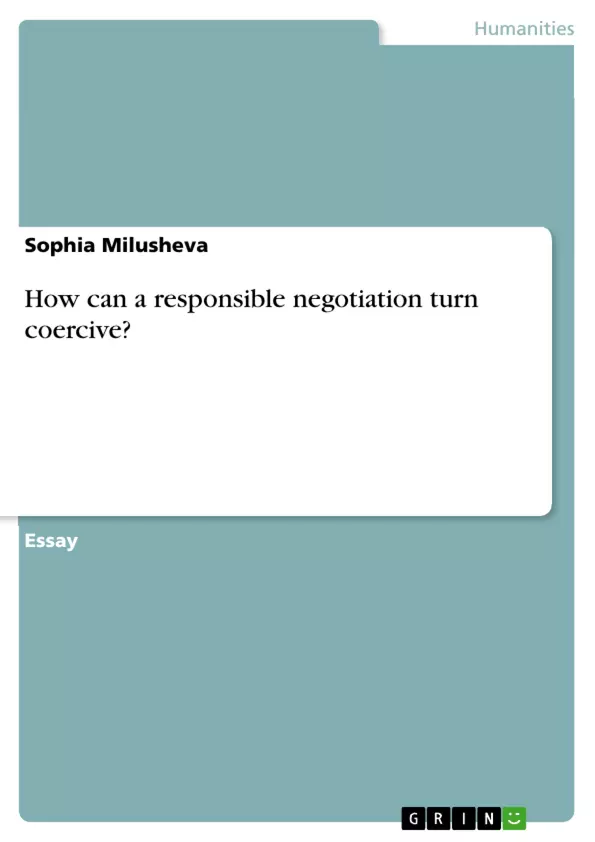At what point does imposing one’s interests cross the line and become coercion? This is the main questions this essay is trying to answer. Responsible and coercive negotiations are not mutually exclusive, just as many things in life are not black and white. It is good to be aware of the type of negotiation one is involved in, and this is best done through attentive listening. One should lean towards responsible negotiations, and mastering the art of recognizing when a responsible negotiation is turning coercive is essential in an important step on the way of becoming a good negotiator.
We spend our entire lives negotiating. Would it be in a formal business meeting with our boss or at the dinner table with our parents, as we grow older, we quickly learn that getting what we want is not always as simple as we wish it were. Learning to be a good negotiator takes time and practice, and of course knowledge on tactics and preparation. Typically, the goal of a negotiation is for both parties to be left better off as the negotiation comes to a closure. These negotiations are called responsible negotiations. Here, the interests and motivations of both parties are building blocks for a win-win outcome. Responsible business negotiations are usually contractual, meaning that through deal-making, parties seek formal agreement.
On the other hand, in conflict or crisis negotiations, parties attempt to negotiate conflict resolutions, in particular in the sphere of international relations or in the context of war. However, not all negotiators have a win-win objective in mind. Often times only forceful persuasion leads to results. These negotiations are called coercive negotiations and involve the use of threat and force to provoke behavior changes. In comparison to responsible negotiations, here the interests of the negotiating parties are used as vulnerabilities.
Inhaltsverzeichnis (Table of Contents)
- Introduction
- Case study
- Manipulation as bridge between responsible and coercive negotiation
Zielsetzung und Themenschwerpunkte (Objectives and Key Themes)
This text aims to explore the distinction between responsible and coercive negotiation, highlighting the factors that can lead a negotiation to become coercive. The article analyzes the legal case of Sand Point Services, LLC vs. NASA, ASBCA Nos. 6189 of August 2019, to illustrate the potential for seemingly responsible negotiations to shift towards coercion.
- The nature of responsible and coercive negotiations
- The role of manipulation in negotiations
- The distinction between persuasion, manipulation, and coercion
- The potential for strategic behavior in responsible negotiations
- The importance of preparation, listening, and relationship-building in negotiations
Zusammenfassung der Kapitel (Chapter Summaries)
- Introduction: This section introduces the concepts of responsible and coercive negotiations, highlighting the importance of understanding their differences and recognizing when a negotiation may be becoming coercive. It emphasizes the need for attentive listening and recognizing the boundaries of both parties during negotiations.
- Case study: This section presents a legal case study involving a contractor and the NASA, where the negotiation evolved from a seemingly responsible one into a coercive one. It outlines the events that led to the contractor being pressured into signing a change order under the threat of termination and the legal repercussions of such actions.
- Manipulation as bridge between responsible and coercive negotiation: This section delves into the concept of manipulation as a bridge between responsible and coercive negotiations. It distinguishes between manipulation, persuasion, and coercion, highlighting the importance of identifying when pressure feels like coercion rather than persuasion. The section also discusses strategic behavior in negotiations, emphasizing the importance of preparation, listening, and relationship-building to avoid coercive tactics.
Schlüsselwörter (Keywords)
This text focuses on key concepts such as responsible and coercive negotiations, manipulation, persuasion, coercion, strategic behavior, preparation, listening, and relationship-building. It also analyzes the use of manipulation tactics, such as "extreme demands," and their potential to lead to coercive outcomes. The text ultimately aims to provide insights into how to navigate negotiations ethically and effectively, recognizing and avoiding the pitfalls of coercion.
Frequently Asked Questions
What is the difference between responsible and coercive negotiation?
Responsible negotiations aim for a win-win outcome based on shared interests. Coercive negotiations use threats, force, or pressure to provoke behavioral changes, treating interests as vulnerabilities.
At what point does a negotiation become coercive?
A negotiation turns coercive when one party crosses the line from persuasion to imposing interests through threats, such as the threat of contract termination or extreme demands.
What role does manipulation play in negotiations?
Manipulation often acts as a bridge between responsible and coercive tactics. It involves strategic behavior that can undermine trust and lead to a shift toward coercion if not recognized.
How can a negotiator recognize coercive behavior?
Attentive listening and recognizing when pressure feels like force rather than logical persuasion are essential. Strategic awareness of "extreme demands" is also a key indicator.
How can coercion be avoided in business deals?
Effective avoidance strategies include thorough preparation, relationship-building, active listening, and maintaining ethical boundaries throughout the deal-making process.
- Arbeit zitieren
- Sophia Milusheva (Autor:in), 2019, How can a responsible negotiation turn coercive?, München, GRIN Verlag, https://www.grin.com/document/1000021



